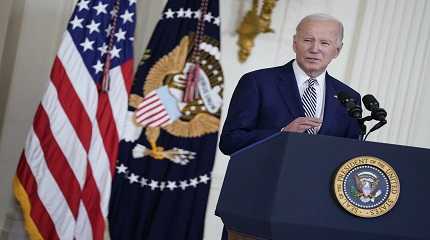
WASHINGTON (AP) — One of President Joe Biden’s favorite stories is about his first international summit after taking office, when he declared that “America is back” in the wake of Donald Trump’s erratic and isolationist leadership.
“For how long?” responded one of the other leaders in the room.
It’s a question that echoes this week as Biden struggles to secure congressional support for continuing American assistance to Ukraine. Even though he’s repeatedly promised that the United States would back Ukraine for “as long as it takes” to defeat the Russian invasion, there’s no sign of a bipartisan deal to maintain the flow of supplies as the war approaches its third year.
A hastily arranged trip to Washington by Ukrainian President Volodymyr Zelenskyy, including a White House visit on Tuesday, did not appear to jolt lawmakers out of their inaction.
The stakes are highest in Ukraine, which faces dwindling supplies of the artillery shells and air defense munitions needed to repel Russian advances. But also hanging in the balance is the kind of U.S. credibility that Biden pledged to restore. Failure to approve new funding would undermine a central plank of the Democratic president’s foreign policy, turning a parable of American resolve into a cautionary tale about American instability.
“They went around telling everybody that America is reliable and dependable,” said Max Bergmann, a former State Department official who’s now a director at the Center for Strategic and International Studies. “And it’s pretty clear that we’re not.”
It’s still possible that lawmakers will reach an agreement, even if takes longer than Biden or Zelenskyy would like. Negotiations continue over a broad legislative package that would support Ukraine, help Israel defeat Hamas in the Gaza Strip and increase security at the U.S. southern border with Mexico.
But the delay, and the public spectacle of political bickering at a moment of grave geopolitical consequence, has emboldened Russian President Vladimir Putin and could reverberate in other places where security depends on American assurances.
“What are the Taiwanese going to think?” Bergmann said. “What are the Japanese, the Koreans going to think?”
“The future of global American leadership,” he added, “is being killed right now in Congress.”
Standing alongside Zelenskyy on Tuesday, Biden said that “I will not walk away from Ukraine, and neither will the American people.” But rather than pledging anew that the U.S. would support Ukraine “as long as it takes,” Biden this time gave a more limited promise that help would be provided “as long as we can.”
Biden said he’s rapidly running out of authorized military assistance, and he expressed bewilderment at the perilous situation.
“It’s stunning that we’ve gotten to this point,” he said.
The congressional roadblock is a reversal of fortune for Biden, whose record on Ukraine was initially celebrated at home and overseas. His administration has helped keep Russia from subjugating the country, which was part of the Soviet Union before achieving its independence in 1991.
Biden maintained unity with European allies despite economic blowback from the war, such as rising gas prices, and spearheaded the enlargement of the NATO with the addition of Finland and likely Sweden, two traditionally nonaligned countries.
Not only has Ukraine remained free, Biden’s approach to the conflict helped vindicate his approach to foreign policy after his administration’s shambolic withdrawal from Afghanistan in 2021.
“Americans of all political backgrounds decided that they would step up,” he said during a surprise trip to Kyiv in February. “The American people know it matters. Unchecked aggression is a threat to all of us.”
But the Russian military, instead of collapsing, retrenched and blunted Ukraine’s counteroffensive this year. Western training and equipment was insufficient to retake significant amounts of occupied territory in the country’s east and south, and the war is now widely viewed as a stalemate.
The U.S. political consensus around the conflict has eroded as well. When the war began in 2021, Democrats controlled both the House and the Senate, and they could count on Republican help to approve money for Ukraine.
The landscape shifted when Republicans won the House majority in the 2022 midterms. Because of slim margins, hardline members of the caucus were empowered, and many are opposed to helping Ukraine. A request for emergency funding for Ukraine went nowhere during recent budget negotiations.
But the White House has routinely swatted away questions about U.S. endurance. Asked on Oct. 2 about potential fatigue over the war, press secretary Karine Jean-Pierre said “if Putin thinks he can outlast us, he’s wrong.”
Charles Kupchan, a senior fellow at the Council on Foreign Relations, said Biden “may have underestimated the difficulty of maintaining a domestic consensus, especially as we head into an election year, when partisanship too regularly trumps wise policy.”
“The domestic politics of the war have gotten a lot more complicated on this side of this Atlantic,” said Kupchan, who was senior director for European affairs at the National Security Council under President Barack Obama. “And it’s beginning to get more complicated in Europe as well. Europeans are watching the stalemate in Congress over Biden’s aid request. And that is, to some extent, empowering voices in Europe that are also reluctant to provide further assistance.”




